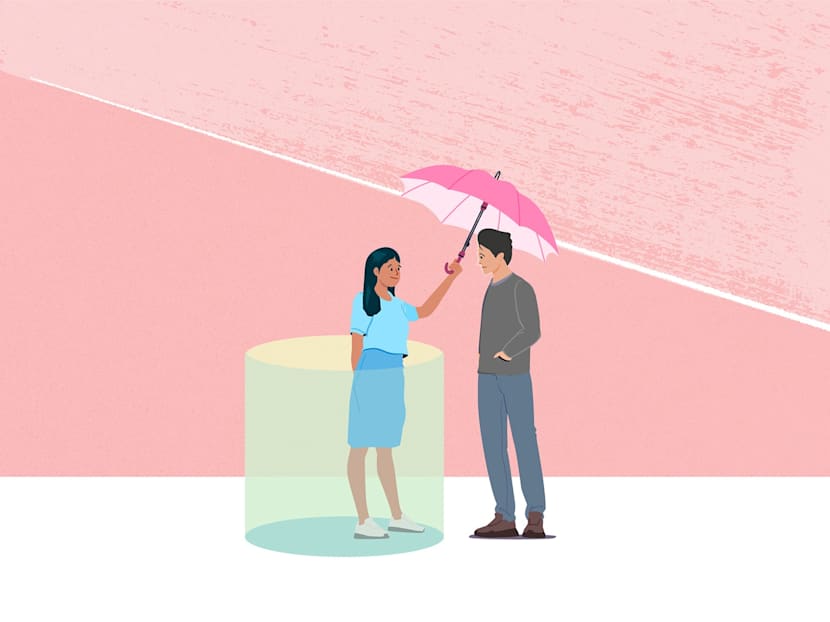Offering a shoulder to cry on is part of friendship. But know where to draw the line
Friends are often our first line of support, but without boundaries, the role of constant listener can become overwhelming. Experts say that knowing your limits is just as important as showing empathy.

Constantly listening to the fears and worries of friends can lead to emotional burnout unless clear boundaries are set, experts warn. (Illustration: CNA/Samuel Woo)

This audio is generated by an AI tool.
When I was 13 years old, a close friend began turning to me for support during his battle with depression.
His pain was raw and constant. Soon, I became the person he trusted with his darkest thoughts, often receiving messages at all hours that were filled with urgent pleas for help.
What began as a desire to help quickly became overwhelming. The pressure to always be there, to listen and to offer comfort often left me feeling suffocated.
If I didn't respond immediately, I feared the consequences. His need for support was unrelenting, and over time, I found myself caught in a cycle of guilt and anxiety, unable to set boundaries or protect my own well-being.
As the years passed, I fell into this pattern repeatedly. I became the go-to person for many friends looking to vent or seek advice about their mental health struggles.
In doing so, I was providing emotional support at the expense of my own mental health.
The more I tried to step back and create space for myself, the more my people-pleasing tendencies pulled me back into this role.
This experience led me to ask: How do so many of us become "the therapist friend"? How can we manage the burden of supporting those we love without losing ourselves in the process?
WHY FRIENDS ARE OUR FIRST LINE OF SUPPORT
When we face emotional challenges, turning to our friends often feels like the most natural thing to do. This instinct stems from the sense of comfort and understanding that friends provide, making them a readily accessible source of support.
The power of peer support lies in its unique ability to offer shared experiences, according to experts.
"When friends go through or have gone through the same life stages and struggles, there's comfort in knowing, 'you get me'," said Ms Amanda Tay, a counsellor at Eagles Mediation and Counselling Centre.
This mutual understanding fosters a deep connection that can help alleviate the feelings of loneliness and isolation that often accompany personal struggles.
Moreover, friends often feel more accessible than mental health professionals such as therapists.
Ms Qi Zhai-McCartney, a psychotherapist and director of Atlas Therapy and Coaching, said: "For young adults, everyday stress over breakups, academic pressures, work challenges and peers can normalise experiences and provide empathy that might feel more authentic than (support from) an older adult or a professional therapist."
In addition to providing comfort, peer networks also help build resilience.
Engaging in strong friendships can improve our short-term mood, increase our physical activity levels, and even help us build a buffer against future mental health challenges, explained Mr Mark Rozario, a clinical psychologist at Mind What Matters.
"It suggests that people who are low on mood tend to go out more and engage in more physical activity if they have friends coaxing them to do so," he said – whether as a gym buddy or going on a casual outing.
WHEN SUPPORT TURNS TO STRAIN
Offering comfort and trust is the core aspect of many friendships, but this dynamic can turn unhealthy if it becomes skewed.
One-sided emotional support can shift the nature of a friendship from mutual connection to emotional caretaking, said Ms Zhai-McCartney. Over time, the friend providing the support may feel drained and guilty, while the one seeking help may become dependent, disempowered or misunderstood.
Imbalances like this can weaken the friendship. "Friendships thrive on reciprocity," she said. "Without it, the bond weakens."
The emotional load can quickly become unsustainable, potentially damaging the friendship if not addressed, said Mr Rozario.
WHEN FRIENDS CAN'T DO IT ALL
While friends are a crucial source of emotional support, they cannot replace the coping skills or structured therapy that may be needed for deeper struggles, the experts said.
"Turning to friends is healthy, but as with everything in life, moderation is key," said Ms Zhai-McCartney. "Asking your friend for advice or venting to them can’t be your only strategy for coping."
Turning to friends is healthy, but as with everything in life, moderation is key. Asking your friend for advice or venting to them can’t be your only strategy for coping.
It is also important to recognise when the emotional weight of a situation surpasses what friends can handle. Ms Zhai-McCartney said: "If (negative) emotions are persistent, pervasive or paralysing, that’s a threshold for professional care."
For those seeking help from their friends, Ms Tay highlighted red flags, including persistent low moods, disruptions in sleep, appetite or focus, and when you feel your friends are drained by your struggles.
At this point, professional support not only provides the necessary tools to manage these challenges but also prevents your friendships from being overburdened.
Over-relying on friends as emotional crutches can prevent us from developing the necessary coping skills and resilience that allow us to navigate challenges independently.
FINDING BALANCE
Being the "therapist friend" can feel rewarding, but without clear boundaries, it can quickly become overwhelming if we don't respect our own limits, the experts said.
Ms Tay likened it to an airplane emergency: "You need to put on your own oxygen mask before helping others. If you're running on empty, it's hard to be truly present for someone else."
Support doesn't always have to be grand; sometimes, small gestures, like running an errand, can be just as meaningful. The key is being upfront about what you can give.
Balancing emotional conversations with lighter moments can also keep friendships healthy. "Laughter and fun are just as bonding as deep talks," said Ms Zhai-McCartney. This ensures the friendship remains positive and emotionally balanced.
It's also important to recognise that sometimes, your role as a friend is to listen, not fix, said Ms Tay. Asking: 'Do you need a listening ear right now, or are you hoping for advice?’ helps protect your energy while still offering support.
When it's time to communicate your limits, Ms Tay and Ms Zhai-McCartney recommended using "I" statements and including "emotion words" to help your friend understand your subjective experience of the friendship, while reassuring them that your shared connection matters to you.
For example: "I really value our friendship, and I want to be there for you. Lately, I've been feeling a bit stretched myself. Could we also find other ways for you to get support, so I can keep showing up in the best way for you?"
To be honest, in my own life, I haven't fully figured out how to strike the perfect balance just yet.
But I've started making small but meaningful changes in how I show up for my friends. Instead of trying to solve every problem or always be available to them, when it comes to what I can give, I'm striving to be honest – not just with them, but with myself.
More importantly, it's about learning to take care of my friendships in new ways – ways that enable me to strengthen and protect my most valued connections without overloading them.












